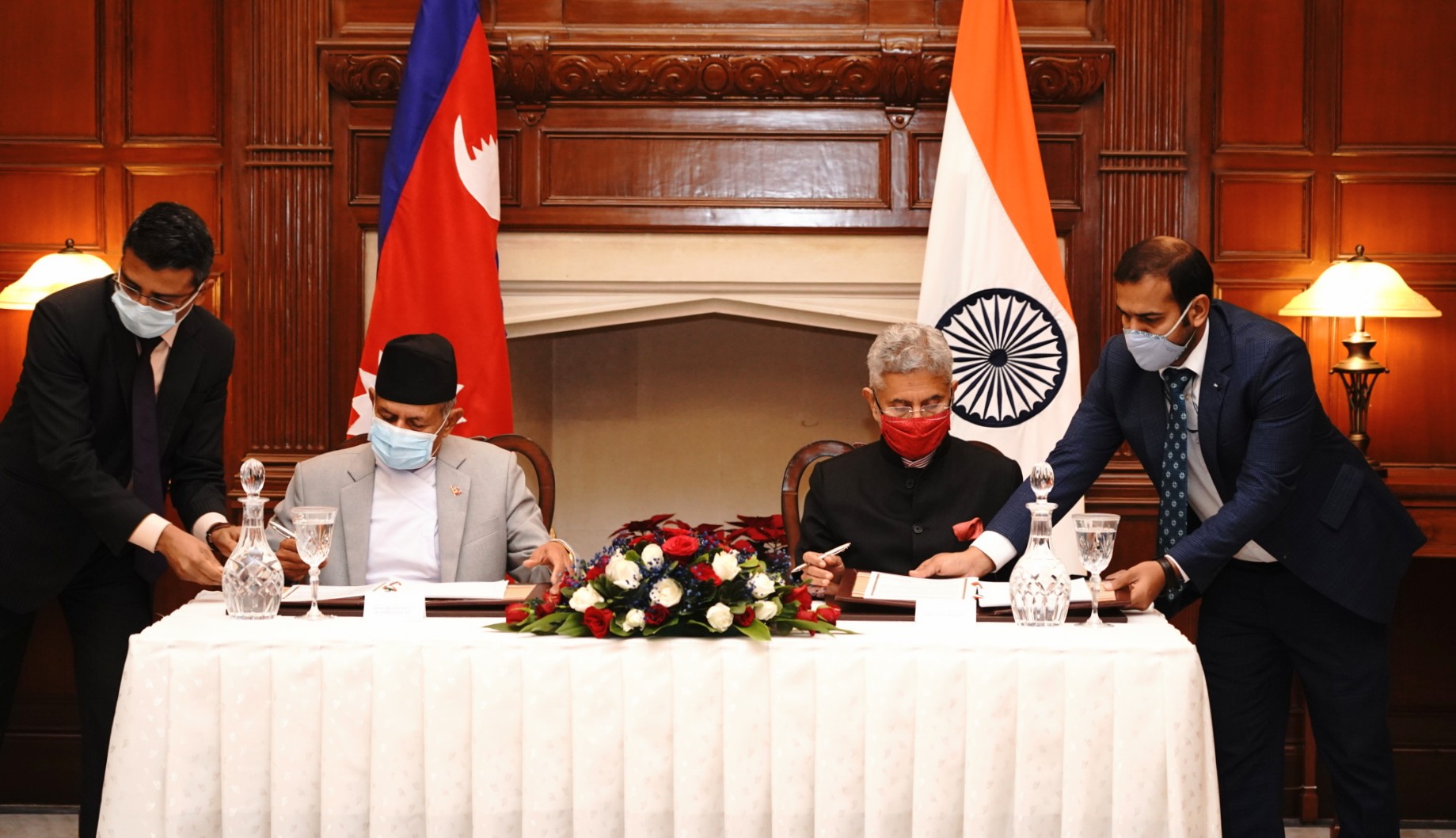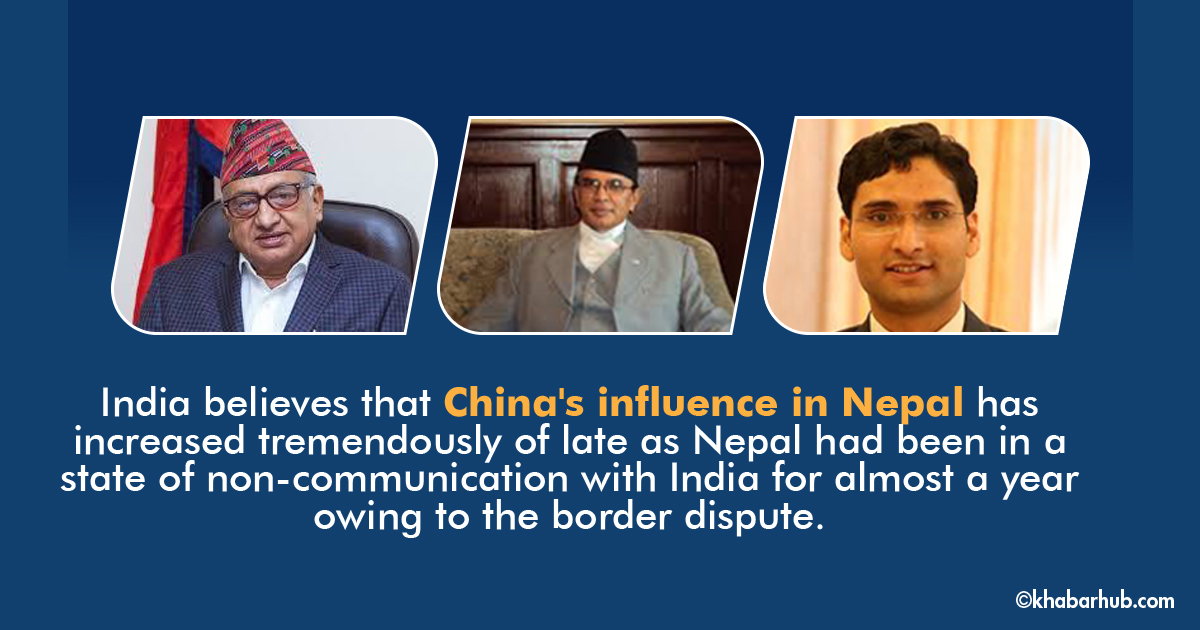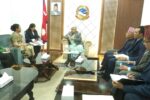KATHMANDU: Foreign Minister Pradeep Gyawali’s intent to raise the issue of border dispute during the sixth round of the Nepal-India Foreign Minister joint level meeting held in New Delhi last week could not materialize.
Nepal had, in fact, wished to discuss the border issue with priority with India during the meeting. Prime Minister KP Oli, too, had said that Nepal would move towards addressing all contentious issues with India this time.
However, Delhi seemed to be reluctant to discuss the border dispute. This becomes evident through the statement issued by Nepal after the talks stating that a “commitment has been made to resolve the border issue as soon as possible”.
The statement also mentions reviewing the 1950 Treaty between Nepal and India and agreeing to receive the report prepared by the Eminent Persons’ Group (EPG) of the two countries.
On the contrary, a statement issued by the Indian side says the issue of border management was discussed during the meeting.

Earlier during the Foreign Secretary-level meeting held in Kathmandu on November 26, the Indian side had expressed its commitment to resolve the border issue from the political level. The border issue coming back to the bureaucracy level, however, had led to confusion about India’s intention.
In fact, the KP Oli-led government — accused of taking an unconstitutional move by dissolving the House of Representatives – endeavored to brand and expose this visit to the international community that the government is still legitimate.
To recall, PM Oli in a recent interview with an Indian television channel had categorically said that his government was not a “caretaker” one even though President Bidya Devi Bhandari dissolved the HoR on December 20 on his recommendation.
However, despite the dissolution of the House and widespread criticism in the country, Foreign Minister Gyawali flew to India to attend the ministerial-level talks claiming that he would take the initiative to resolve the border issue with the southern neighbor.
Here, former Ambassador of Nepal to India Deep Kumar Upadhaya dubbed foreign Minister Gyawali’s visit as “unproductive”.
“It has been quite evident that the meeting was not held cordially. Had it been so, the statements issued by both the sides would have been similar,” he claimed, adding, “The issuance of different statements by the foreign ministries of the two countries should be understood as a sign that the talks have not been as successful as touted in Nepal.”
India’s foreign ministry said in a regular press conference on Thursday that it had other mechanisms to discuss border issues, and hinted that the issue was not a priority during the ministerial-level talks.
Meanwhile, former foreign secretary of Nepal, Madan Kumar Bhattarai argued that the visit should be taken as a “regular” one.
“Although the visit after a hiatus may seem special, Foreign Minister Gyawali’s visit to India is simply a regular one, and there is nothing to link it with any other strategy,” he said.
Notwithstanding the failure to achieve the expected outcome, Foreign Minister Gyawali’s visit to India has been successful to “convince” India to supply vaccines against COVID-19, which has claimed around 1,948 lives in the country so far.
With India’s commitment to providing the vaccines, there is room for hope. Former foreign secretary Bhattarai said this is not new in diplomacy for a stronger neighbor to help another neighbor while in need.
However, speculations are that the issue of supplying vaccines to Nepal has been linked with a strategic approach amid China’s growing influence in Nepal.
India, which was embittered with Nepal over the border dispute, has been endeavoring to smoothen its relations with Nepal in recent times.
New Delhi has been striving to improve relations with Nepal of late. The visit of Samanta Goel, Chief of the Research and Analysis Wing (RAW), to Nepal in the third week of October last year is a suggestion, followed by two other high-level visits.
Former ambassador Upadhyaya said that the corona vaccine has come as a cornerstone to this approach. Moreover, he did not deny the fact that the commitment of the vaccine could be on humanitarian grounds.
Meanwhile, foreign affairs experts say that India can give Nepal the required amount of coronavirus vaccines to prevent the influence of other countries.
Indians also believe that China’s influence in Nepal has increased tremendously of late as Nepal has been in a state of non-communication with India for almost a year owing to the border dispute.
In order to consolidate its presence in Nepal, India has promised to provide the required amount of corona vaccine, according to foreign affairs experts.
Analyst Rupak Sapkota says India, which is worried about China’s growing influence in Nepal finds the vaccine as a way to further secure its influence.
Pointing to the recent high-level visits to Nepal from India, Sapkota said, “India is trying to increase their influence in Nepal, after the turmoil in relations following the border row. The corona vaccine commitment is a continuation of that.”
With the dissolution of the House, Nepal-India relations are gaining momentum amid speculations that PM Oli has a souring relation with China recently.
Therefore, Nepal is believed to have agreed to support India to become a permanent member of the United Nations during the ministerial talks.
It has also been analyzed that India’s achievement of this commitment with Nepal during its high-level visit from Nepal after a gap of more than a year was a diplomatic “upper-hand” of India.
India, currently a non-permanent member of the United Nations Security Council, has been making constant efforts to gain permanent membership.









Comment